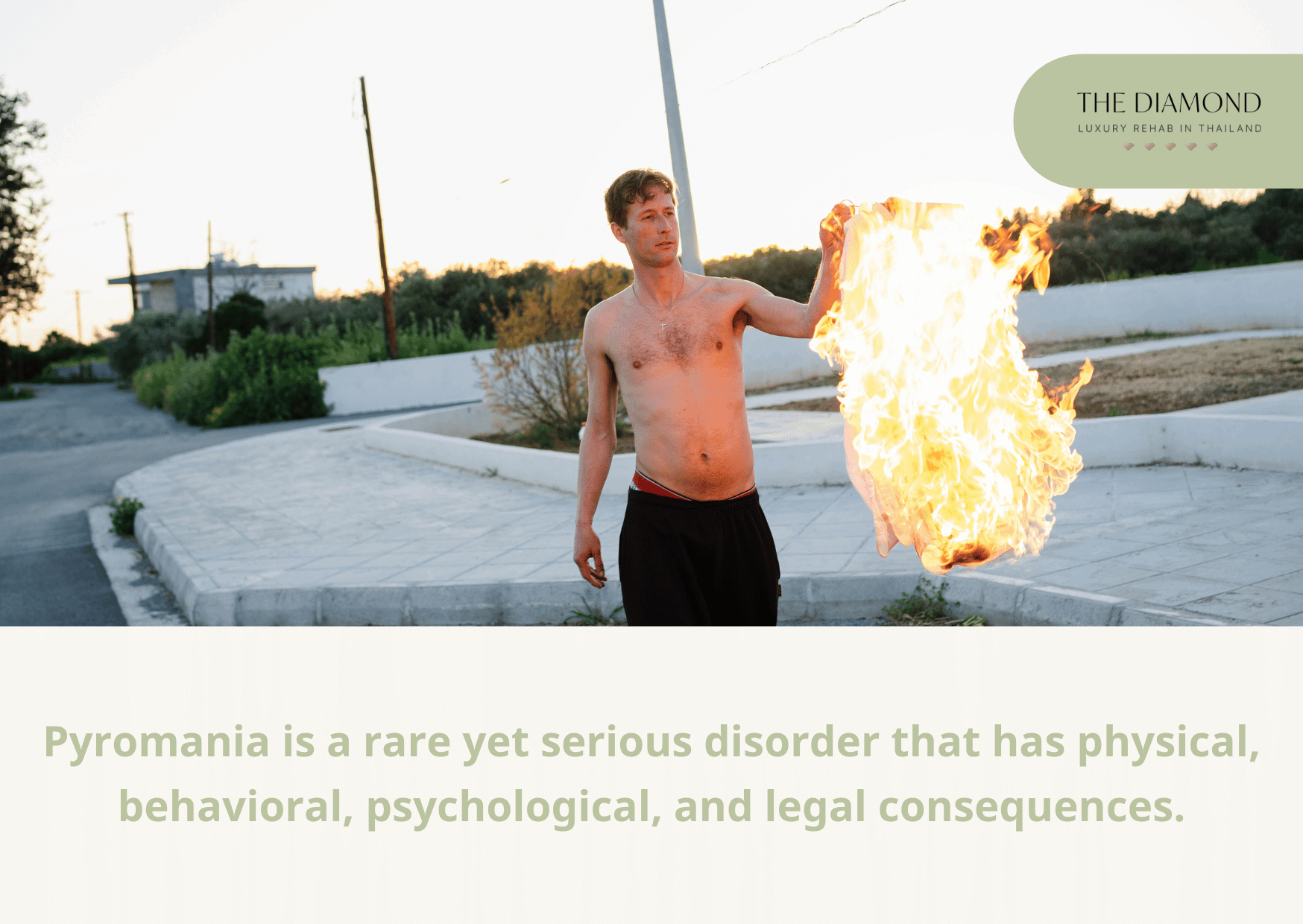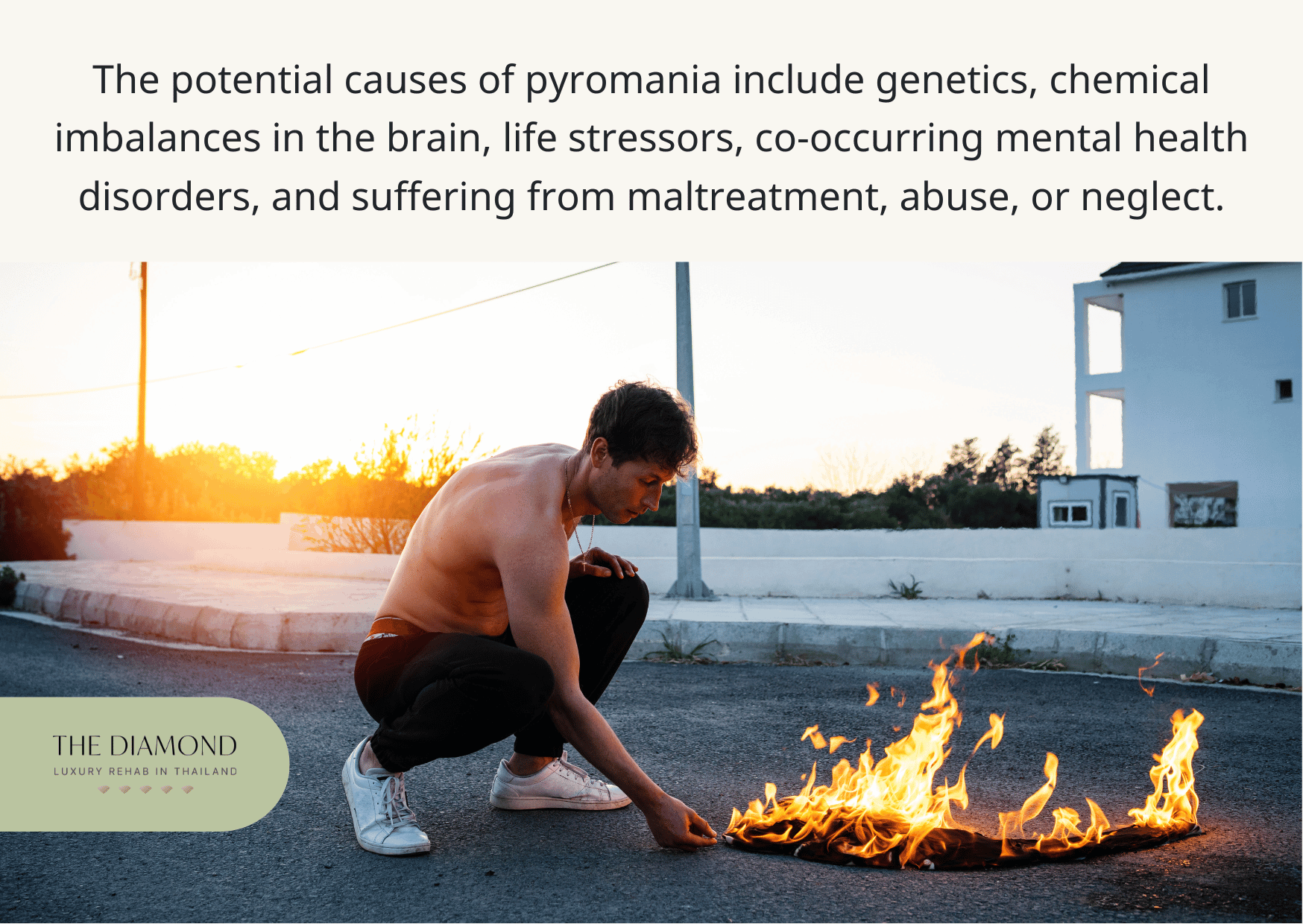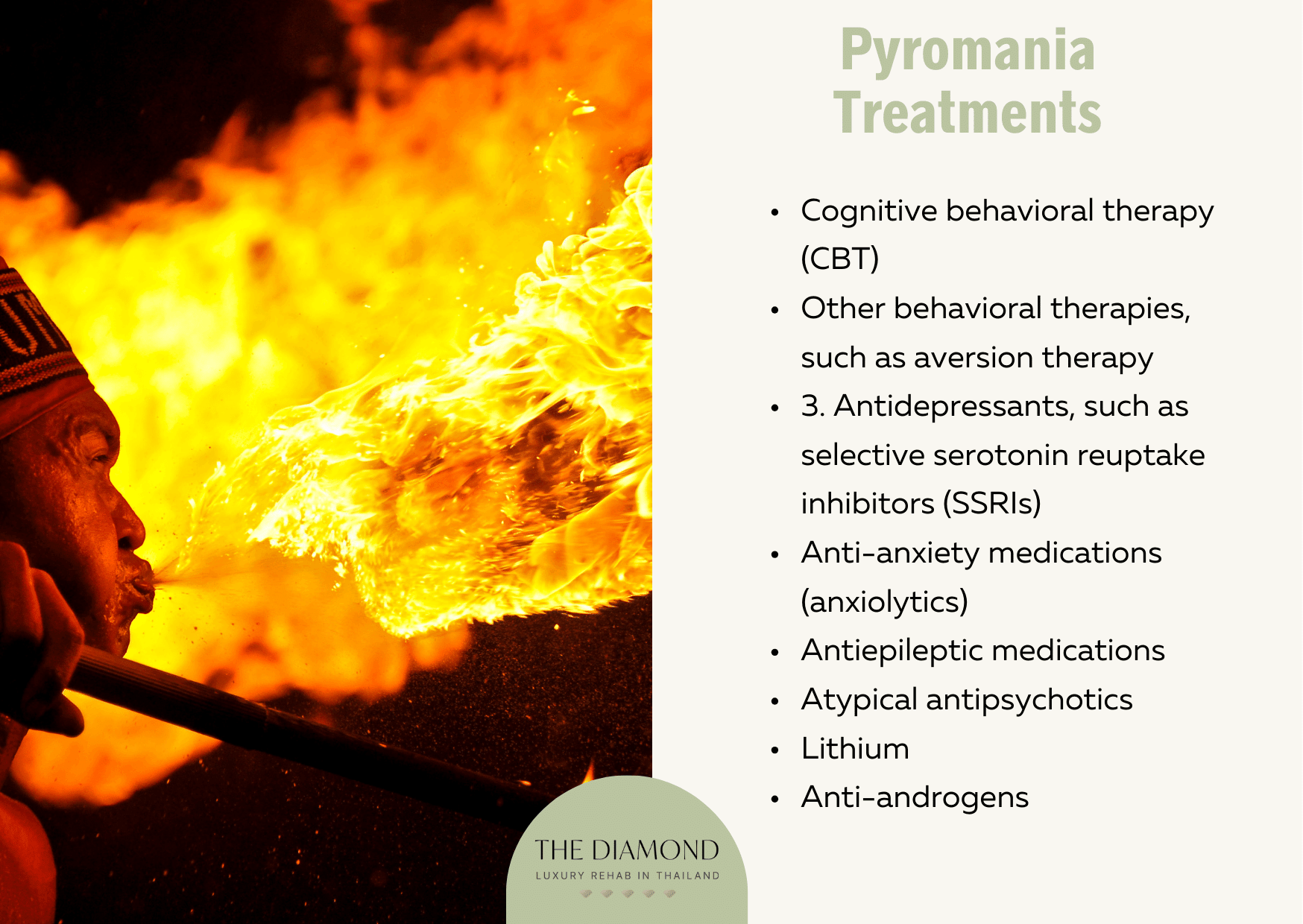Pyromania symptoms and treatment

When being drawn to fire turns into an unhealthy behavior, this may be indicative of pyromania. The primary symptom of pyromania is deliberately starting a fire more than once and deriving pleasure out of it.
Although pyromania is often thought to be the same as arson or fire-starting, the key difference of pyromania is that the person suffering from the condition carries out the fire-setting behavior without a clear reason or goal.
Because pyromania is an uncommon disorder, research on the most effective types of treatment for the condition is scarce. However, experts believe that individuals suffering from pyromania may benefit from cognitive-behavioral therapy (CBT) and certain medications, or a combination of both.
What are the symptoms of Pyromania?
The onset of symptoms may begin at puberty and last until adulthood. Pyromania is a rare yet serious disorder that has physical, behavioral, psychological, and legal consequences. These include an increased risk of injury, damage to property, jail time, and even death.
It is important to recognize the characteristics of a suspected pyromaniac to seek timely treatment and avoid the often-debilitating effects of the disorder. The symptoms of pyromania are listed below.
1. An uncontrollable urge to set fires
People with pyromania have an overpowering urge to set fires that they repeatedly fail to resist. They are aware of the potential harm or damage that their action will cause. However, setting a fire is the only way they can have an immediate release of the tension and stress they feel before the act of fire setting.
2. Fascination and attraction to fire and its paraphernalia
Pyromaniacs have an unhealthy fascination with fire and its paraphernalia. They may develop a strong interest and curiosity about anything that is fire-related, and this includes collecting fire-setting paraphernalia.
3. Pleasure, a rush, or relief when setting or seeing fires
One symptom of pyromaniac disorder is the gratification from setting or seeing fires. This also includes deriving pleasure from witnessing fires or participating in their consequences.
4. Tension or excitement around fire-starting
Pyromaniac symptoms also include experiencing a buildup of tension, anxiety, or affective arousal before the act of fire setting. For people battling pyromania, the only way they can be relieved of these feelings is by starting a fire.

What are the causes of Pyromania?
The potential causes of pyromania include genetics, chemical imbalances in the brain, life stressors, co-occurring mental health disorders, and suffering from maltreatment, abuse, or neglect.
Impulse control disorders such as pyromania have a strong genetic component. Evidence exists that family members of those with such disorders are at an elevated risk of developing one of these conditions themselves.
Studies also suggest that brain chemicals such as dopamine and serotonin play a major role in the development of pyromania. People who suffer from pyromania also deal with other mental health issues like anxiety, depression, substance abuse, mood disorders, addiction, or learning disabilities as a result of their lack of control over their impulses.
Additionally, pyromania symptoms may stem from physical and sexual abuse, maltreatment, or neglect during childhood.

What are the characteristics of a Pyromaniac?
The characteristics of a pyromaniac include having an unhealthy fascination with fire and its situational contexts, experiencing tension or anxiety before setting fires, and deriving pleasure, gratification, or relief when starting fires or when witnessing or participating in its consequences.
Although there are different types of pyromania, these key features of the condition mainly constitute what is a pyromaniac. Being obsessed with fire and its situational contexts means having an unhealthy attraction to anything fire-related, including its paraphernalia, uses, and consequences.
Pyromaniacs tend to collect fire-setting paraphernalia, such as torches or matches. They also have an increased likelihood of being fire watchers, and their fascination with fire often draws them to pursue a career as a firefighter, where they get to fuel their obsession up close.
People with pyromania experience tension or anxiety prior to the act of setting a fire, and they feel that they can only be released from these negative feelings by starting a fire. As a result, pyromaniacs immediately have rewarding feelings such as pleasure and gratification upon relief from stress and anxiety.

What are the risk factors for Pyromania?
The risk factors for pyromania include being male, having learning disabilities, experiencing child abuse or neglect, and having poor social skills. Different types of pyromania have been identified by experts, and those who have the condition are predominantly male.
Fire setting being a male-dominated behavior may explain the gender differences among pyromaniacs. Learning disabilities may also play a role in pyromania. The disorder appears to be more common in individuals with deficits in learning and in those who are below the range of normal intelligence.
Being exposed to physical or sexual abuse, neglect, or maltreatment as a child may also trigger symptoms of pyromania. These people are also more likely to have been witnesses of their parents’ drug use or violent acts.
Pyromania tends to be more common in people who lack social skills. People with this type of impulse control disorder often report significant impairment in social and occupational functioning.
When should a Pyromaniac seek advice from a doctor?
A pyromaniac should seek advice from a doctor if they have an unhealthy obsession with fire and can no longer resist the urge to destroy something with it. It is worth noting, however, that due to the strict diagnostic criteria of pyromania, it is typically hard to diagnose and someone needs to actively seek treatment in order to be given a diagnosis of the disorder.
But seeking timely treatment for suspected pyromania is imperative to avoid some of the most serious consequences of the condition, such as damage to property, harm to other people, a prison sentence, and even death.

What are the possible treatments for Pyromania?
Due to a lack of research, there are no approved standard-of-care treatment approaches for pyromania. This is why medical experts believe that pyromaniacs may benefit from one or more of the following proposed treatments:
1. Cognitive behavioral therapy (CBT)
A form of psychotherapy that teaches individuals with pyromania how to identify and change destructive thoughts and behavioral patterns that may lead them to start fires. Cognitive-behavioral therapy (CBT) also encourages the development of healthy coping strategies so that afflicted people can work past their impulses and triggers. The average cost of CBT is $65-$200 per session but may also change depending on certain factors.
2. Other behavioral therapies, such as aversion therapy
Aversion therapy works by pairing deviant behavior with discomfort. In this case, a person undergoing aversion therapy to reduce fire setting behavior may be exposed to something unpleasant such as a foul smell or an electric shock each time they are shown an image of fire. The goal of this treatment method is to make the person associate the unwanted behavior or action with uncomfortable sensations. Other forms of therapy that could also work for impulse control disorders are covert sensitization and imaginal desensitization.
3. Antidepressants, such as selective serotonin reuptake inhibitors (SSRIs)
Antidepressants are a form of pyromania treatment that is used when the condition is believed to have stemmed from traumatic life events and depression. These medications are prescribed by doctors under the rationale that managing negative emotions that may trigger pyromania will likely reduce the urge to start fires. Without insurance, the cost of generic antidepressants is around $62.50 for 30 tablets. Brand-name antidepressants may be costlier, at around $487.75. It is possible to pay a lower price if the medications are covered by one’s insurance.
4. Anti-anxiety medications (anxiolytics)
Because one characteristic of pyromania is having built-up tension, anxiety, or affective arousal before starting a fire, anti-anxiety drugs may be used as a treatment for pyromania. Anxiety leads to impulsivity in some instances, and individuals suffering from anxiety disorders may find ways to manage their anxiousness, even in ways that are not positive or healthy. Brand name anti-anxiety drugs may cost a person about $1,000 without insurance, but switching to generic brands may reduce the price to only $67.04.
5. Antiepileptic medications
Antiepileptic drugs have been increasingly used as additional treatments for impulse control disorders, and their efficacy even in patients without a seizure disorder remains to be established.
6. Atypical antipsychotics
Used when medical professionals feel that pathological fire setting may have occurred as a form of psychotic behavior, the use of atypical antipsychotics has been shown to decrease impulsivity in patients with psychosis. However, this still warrants further study, as there is little evidence on the long-term efficacy of atypical antipsychotics for pyromania.
7. Lithium
Lithium is a type of mood stabilizer that can be used to treat pyromania disorder in cases where a person’s need to set fire is rooted in mood swings. It has shown benefits in reducing impulsivity, with the thought that the absence of mood swings may significantly decrease the urge to set fire to release negative emotions.
8. Anti-androgens
Anti-androgens are medications that block the effects of androgens, such as testosterone. These drugs are used for lowering sexual thoughts and behaviors, which can be manifestations of other disorders, such as pyromania. Anti-androgens may be used in cases where pyromania has stemmed from sexual abuse or childhood trauma.

